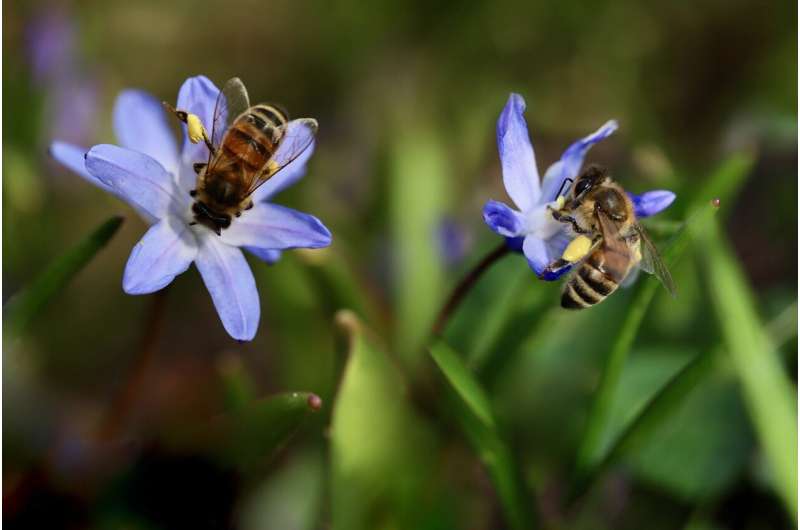This article has been reviewed according to Science X's editorial process and policies. Editors have highlighted the following attributes while ensuring the content's credibility:
fact-checked
peer-reviewed publication
trusted source
proofread
Air pollution harms pollinators more than pests, study finds

Bees and other beneficial bugs are disproportionately harmed by air pollution when compared to crop-destroying pests, a new study published in Nature Communications has found.
Researchers from the University of Reading analyzed data from 120 scientific papers to understand how 40 types of insects in 19 countries respond to air pollutants like ozone, nitrogen oxides, sulfur dioxide and particulate matter. Pollinators—including bees and some moths and butterflies—experienced a 39% decline in foraging efficiency after being exposed to elevated air pollution levels. In contrast, plant-eating aphids and other pests were not significantly impacted.
The study has important implications for agriculture and food security.
Dr. James Ryalls, of the University of Reading, led the study. He said, "Air pollution is an underappreciated threat to the insects that make our lives easier. The bees that pollinate our flowers and the wasps that provide natural pest control are at risk of further decline if air pollution levels are not addressed.
"We are facing a 'lose-lose' scenario where air pollution harms helpful insects without affecting pests, potentially leading to greater crop damage, reduced yields and less food on supermarket shelves. Insect populations are already declining globally, and even moderate levels of air pollutants are harming beneficial insects, meaning we need stricter air quality regulations to protect nature's hardest workers."
Different smells
The researchers suggest that beneficial insects—such as bees and wasps—are more affected by air pollution due to their reliance on scent-based communication. Many beneficial insects use airborne chemical signals to locate flowers, find mates, or hunt their prey. Air pollutants can chemically alter these scent trails or interfere with insects' ability to detect them, essentially disrupting their sensory landscape. In contrast, many pests rely less on long-distance scent cues and more on direct contact or visual cues, making them less vulnerable to air pollution's effects on airborne chemical signals.
The study focused on how air pollution affects various aspects of insect behavior and biology, including feeding, growth, survival, reproduction, and ability to locate food sources. Of all these factors, insects' ability to find food was most severely impaired by air pollution, declining by about one-third on average.
Among air pollutants, ozone emerged as particularly harmful to beneficial insects, reducing by 35% their ability to thrive and carry out their roles in the ecosystem. Even low ozone levels below current air quality standards caused significant damage. Nitrogen oxides also substantially impaired beneficial insects.
More information: Air pollution disproportionately impairs beneficial invertebrates: a meta-analysis, Nature Communications (2024). DOI: 10.1038/s41467-024-49729-5
Journal information: Nature Communications
Provided by University of Reading





















